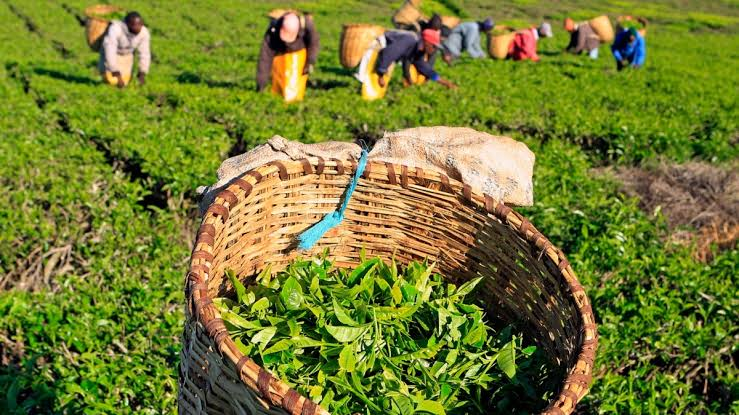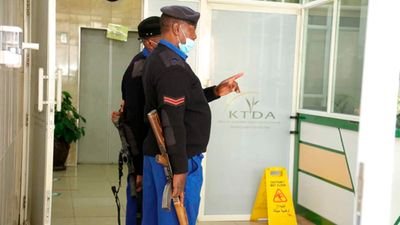News
Inside Sh600M Looting By KTDA Officials
The “Inspection Report of Kenya Tea Development Agency” detailed how KTDA officials used farmers’ money for personal gain, impoverishing them.

An audit report presented to President William Ruto found that 620,000 small-scale tea producers lost over Sh600 million to KTDA personnel in questionable transactions. Two commercial banks that collapsed lost Sh3 billion slated to pay farmers dividends, the study said.
President Ruto received the 130-page confidential report on the well-orchestrated and huge theft of farmers’ money at State House, Nairobi, two weeks ago at a meeting with KTDA directors. Apparently, the President urged action on the report.
After farmers complained about cartels ripping them off, Deputy President Rigathi Gachagua is leading tea and coffee reforms. The audit included recommending the prosecution of former KTDA directors and senior personnel and the tracking of assets bought with farmer loot.
Fraudulent finances
The “Inspection Report of Kenya Tea Development Agency” detailed how KTDA officials used farmers’ money for personal gain, impoverishing them.
Former President Uhuru Kenyatta ordered KTDA’s financial investigation in Executive Order No. 3 of 2021. Leadership conflicts and financial misdeeds plagued KTDA. The confidential document has been locked up in the AG’s office and reveals KTDA’s tax evasion and financial violations. The report recommended surcharging or prosecuting several directors and top managers for the notable conflict of interest.
The research also lists 12 urgent tea reform problems for the government. These include KTDA’s lack of financial transparency, commerce with countries without established banking systems, malpractice at the Mombasa tea auction, and tax evasion.
The report also advised the government to investigate irregular land transactions and overstated legal costs as part of a larger plot to loot farmers’ money. The audit states KTDA officials’ lack of due diligence in land purchases cost farmers Sh542 million in fraudulent deals.
In one case, the old administration overpaid for 50 acres of Nyandarua land. The board authorised the land purchase at Sh39,984,000, or Sh800,000 per acre. The audit noted that the land was appraised at Sh750,000 per acre. KTDA bought property to plant tea factory trees in another shady deal. This land is Laikipia/Nyahururu 12607. This sale cost Sh15,515,600 for eight hectares. Fuel wood plantation Despite the KTDA forest officer’s report that the property was unsuitable for a wood fuel crop.
The audit advised the Ethics and Anti-Corruption Commission (EACC) and Directorate of Criminal Investigations (DCI) to investigate all land parcels and determine the amount of cash wasted. The Sh2.3 billion spent on power plants and hundreds of millions due by foreign corporations that bought Kenyan tea are other concerns. KTDA’s financial statements don’t list the debts.
Due to this wanton looting, the audit recommends prosecuting directors and top management for theft by servant. The audit stated, “Investigate elements of fraud perpetrated by KTDA directors and senior management, raising need for asset recovery authority to pursue recovery proceedings for tea factories’ money lost.”
Overpayment to KTDA lawyers cost farmers additional Sh101 million, according to the investigation. This complex syndicate included notable lawyers whose money came from KTDA high executives. The current KTDA directors persuaded the President to implement the inspection report in April.
The government received the report on July 9, 2021, but KTDA authorities revived it two weeks ago. Mr. Wilson Njenga, a former senior staff member of the Office of the President, and Mr. Arthur Osiya, joint inspection team chairs, sent Attorney General Paul Kihara the report in July 2021. If tea farmers want to profit from their labour, the two stated fundamental adjustments are needed. Officers from 10 state departments investigated. Mr. Gachagua, who has led tea and coffee reforms, met with KTDA’s top leadership on April 25 at the DP’s Karen residence.
Mr. Gachagua’s Chief of Staff, Ms. Wanjiku Wakogi, wrote to KTDA chairman Enos Njue stating the meeting was a follow-up. Ms. Wakogi wrote on April 19, 2024, that the conference would debate the national tea official elections. She emphasised certain heated court cases. She stated in the letter that former directors had agreed to drop all court challenges challenging their dismissal as part of government attempts to implement the Tea Act.
Ability to contest
It was also decided that current and past directors could run in the August 16 elections. At this meeting, the current board of directors and the ousted team established compromise on several of the subjects that had caused severe conflict.
Economic Crimes Unit investigators from the DCI headquarters are in Mombasa to capture tea auction statements. The chief inspector of police-led squad has recorded statements and gathered records on tea exports from the country in the last three years at the seashore.
The State House meeting prompted this new probe. The audit also criticised KTDA for trading with sanctioned nations. Due to banking concerns, these countries have trouble making payments, according to the audit. Despite hurdles, these countries received Sh488 million in tea exports from 2015 to 2020.
In August 2020, one country had not paid Sh194.5 million of this massive amount. Such transactions may be hidden from financial documents, understating income and underpaying farmers. Audit says there are no clear debt recovery mechanisms.
The audit advises KTDA to consult with the Ministry of Foreign Affairs before doing business with sanctioned nations and to investigate all money received to guarantee it is property. The prior board’s power project cost farmers approximately Sh2 billion, another astounding waste.
Four power production companies received Sh4.8 billion to cut tea factory power costs. Four electricity companies—Chania, Metumi, Gura, and Imenti—are operating below 60% capacity.
These initiatives were over-designed and overestimated, costing farmers Sh2.3 billion in payouts, according to the auditors. The audit recommends reassessing power projects for efficiency and prosecuting persons with interest in altering project designs. Two former KTDA executives are of interest in this plan.
Kenya Insights allows guest blogging, if you want to be published on Kenya’s most authoritative and accurate blog, have an expose, news TIPS, story angles, human interest stories, drop us an email on [email protected] or via Telegram
-

 Grapevine1 week ago
Grapevine1 week agoAlleged Male Lover Claims His Life Is in Danger, Leaks Screenshots and Private Videos Linking SportPesa CEO Ronald Karauri
-

 Lifestyle2 weeks ago
Lifestyle2 weeks agoThe General’s Fall: From Barracks To Bankruptcy As Illness Ravages Karangi’s Memory And Empire
-

 Grapevine6 days ago
Grapevine6 days agoRussian Man’s Secret Sex Recordings Ignite Fury as Questions Mount Over Consent and Easy Pick-Ups in Nairobi
-

 Investigations3 days ago
Investigations3 days agoMulti-Million Dollar Fraud: Three Kenyans Face US Extradition in Massive Cybercrime Conspiracy
-

 Investigations2 weeks ago
Investigations2 weeks agoEpstein’s Girlfriend Ghislaine Maxwell Frequently Visited Kenya As Files Reveal Local Secret Links With The Underage Sex Trafficking Ring
-

 Economy2 days ago
Economy2 days agoIran Demands Arrest, Prosecution Of Kenya’s Cup of Joe Director Director Over Sh2.6 Billion Tea Fraud
-

 News2 weeks ago
News2 weeks agoState Agency Exposes Five Top Names Linked To Poor Building Approvals In Nairobi, Recommends Dismissal After City Hall Probe
-

 Business1 week ago
Business1 week agoM-Gas Pursues Carbon Credit Billions as Koko Networks Wreckage Exposes Market’s Dark Underbelly


















